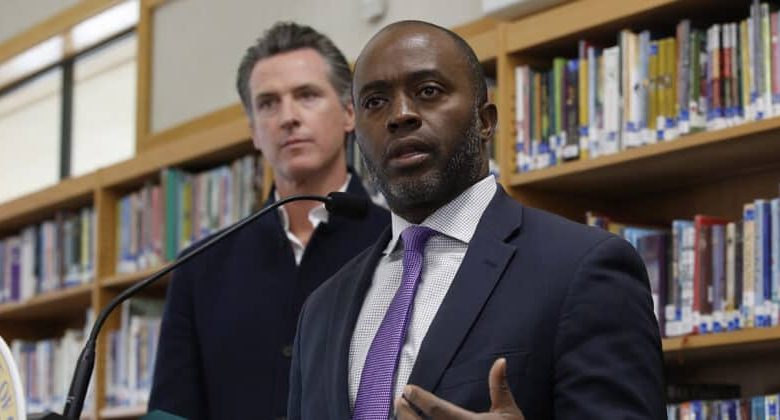California Official Tony Thurmond to Convene ‘Artificial Intelligence in Education’ Workgroup

State Superintendent Tony Thurmond launches first-in-nation legislative effort to guide AI use in K-12 schools
California State Superintendent Tony Thurmond will convene the first meeting of a groundbreaking Artificial Intelligence in Education workgroup Friday at the California Department of Education headquarters in Sacramento, marking the state as a national leader in addressing AI’s role in public schools.
The workgroup was established following passage of Senate Bill 1288, legislation co-sponsored by Thurmond that creates the first legislatively mandated, statewide effort focused on AI in K-12 education nationwide.
Diverse Stakeholder Representation
“Workgroup members are representatives from various organizations, including technology leaders. The majority are educators, and this workgroup also includes students,” Thurmond explained. “We want to ensure that those who will be affected by this guidance and policy have a voice in creating it.”
The inclusion of students in policy development reflects Thurmond’s commitment to centering those most impacted by educational technology decisions. The workgroup represents his broader approach to developing public-private partnerships that drive innovation in public education while maintaining student-centered priorities.
Thurmond’s Personal Journey Shapes Approach
Thurmond’s leadership on AI policy stems from his personal understanding of educational equity challenges. Raised by a cousin after his Panamanian immigrant mother died when he was six, Thurmond experienced poverty, food insecurity, and the challenges of navigating predominantly white educational spaces as an Afro-Latino child in racially segregated Philadelphia.
His childhood experience of being bused daily to a majority-white neighborhood school, where he occasionally faced discrimination and was told to “get out of this neighborhood,” shaped his commitment to ensuring all students have access to quality education regardless of background.
After working his way through Temple University loading UPS trucks and working McDonald’s night shifts for $3.35 an hour minimum wage, Thurmond dedicated his career to helping young people facing similar hardships. He established transitional housing programs for foster youth and developed school-based mental health programs addressing chronic absenteeism.
California’s Comprehensive AI Framework
The state has developed extensive guidance for educators navigating AI integration, emphasizing both opportunities and risks. California’s approach prioritizes human relationships in education, recognizing that AI cannot replace “the value of a student’s relationship with a caring educator who can connect on a human level.”
The framework addresses key areas including safe AI use through data privacy compliance, accessibility and personalization for diverse learners, and developing students as AI creators rather than just consumers. Special attention focuses on expanding access for traditionally underrepresented groups in technology fields.
Equity and Bias Concerns Central
Thurmond’s initiative emphasizes addressing algorithmic bias and social impacts of AI, aligning with his broader “Antibias Education Initiative.” The guidance warns that “biased data collection can perpetuate stereotypes and discrimination” and calls for educators to integrate “discussions about algorithmic bias into existing curriculum.”
The approach recognizes that AI algorithms on social media platforms can lead students toward narrow viewpoints, potentially hindering “constructive dialogue and understanding between students, leading to feelings of isolation and frustration.”
Mental Health Integration
The AI framework intersects with Thurmond’s Mental Health Support Initiative, acknowledging potential psychological impacts of AI use. Guidance emphasizes maintaining human connections while leveraging AI’s benefits for accessibility and personalization.
“AI should complement, not replace” human relationships in education, according to the state’s framework. The approach encourages using AI to facilitate peer collaboration while ensuring technology enhances rather than replaces essential human elements.
National Model for AI Education
California’s legislatively mandated approach positions the state as a model for other jurisdictions grappling with AI integration in schools. The workgroup’s recommendations will likely influence national conversations about educational technology policy.
The initiative comes as school districts nationwide struggle with questions about appropriate AI use, from concerns about academic integrity to questions about data privacy and algorithmic bias.
Looking Forward
Friday’s inaugural meeting will begin developing specific guidelines for California’s 6.2 million K-12 students across more than 1,000 school districts. The workgroup faces complex challenges balancing AI’s potential benefits for personalized learning and accessibility against legitimate concerns about data privacy, bias, and the preservation of human-centered education.
Thurmond’s personal journey from poverty to leading the nation’s largest state education system brings unique perspective to ensuring AI serves all students equitably. His emphasis on including student voices in policy development reflects commitment to authentic stakeholder engagement in shaping California’s educational technology future.
The workgroup’s recommendations will likely establish precedents for AI governance in education that extend far beyond California’s borders, making Friday’s meeting a significant moment in American educational policy.




